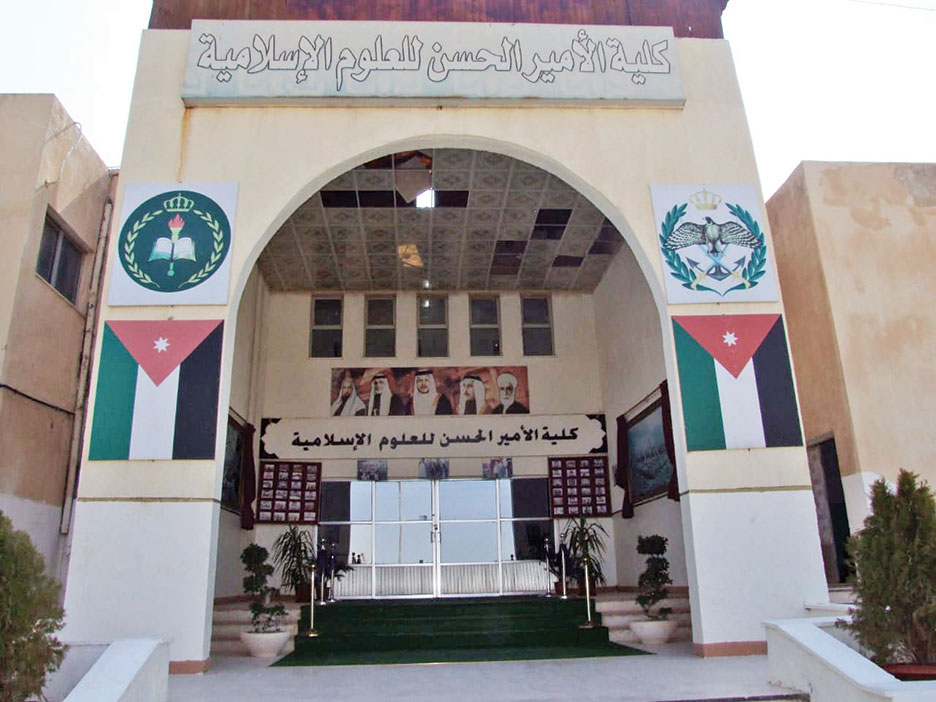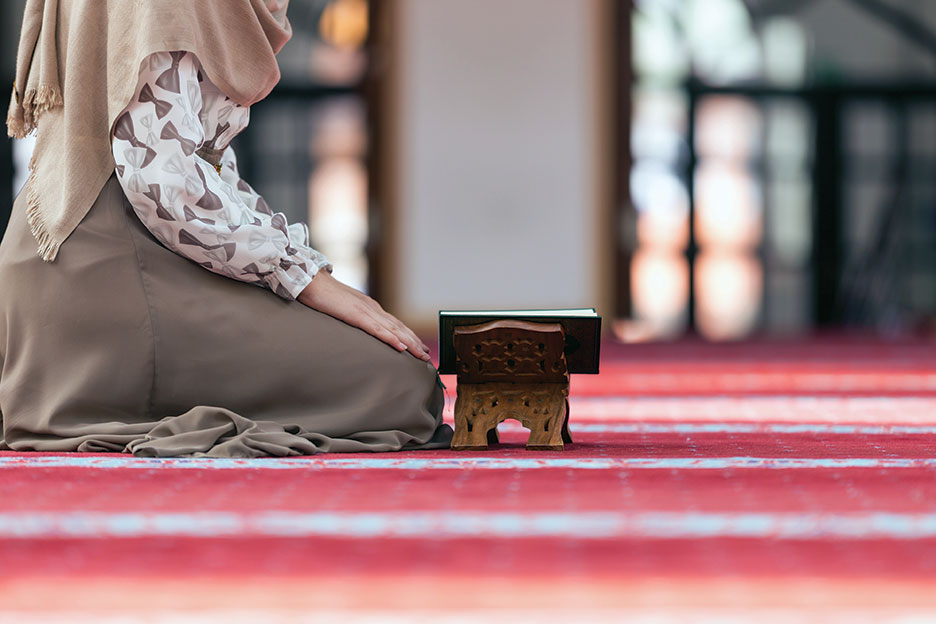The Jordan Armed Forces trains female preachers to advise Soldiers and civilians
Unipath met with Brig. Gen. Dr. Ibrahim Saeed Abu Aqab, dean of Prince Hassan College for Islamic Studies; Col. Muhammed Ali Al Shara, assistant dean of the college; and Maj. Dr. Khalid Al-Battush, a lecturer at the college, to discuss the program of preparing female preachers to serve in the Armed Forces of the Hashemite Kingdom of Jordan.
Unipath: Tell us about the project to prepare female preachers in the Jordan Armed Forces? How did the idea crystallize and what are the objectives?
Brig. Gen. Ibrahim: In the name of God the Most Merciful, Most Gracious, the idea of female preachers partly came about in recognition that female Soldiers in the Armed Forces require religious preaching and moral support. We began to recruit civilian and military female preachers and assigned them duties commensurate with the needs of women in uniform for religious guidance. It is true that their functions may overlap with those of imams in the Armed Forces, but we thought women in general prefer to communicate with female preachers to address issues concerning women. Previously, student preachers did not have a preparatory program. In fact, some of them served in other branches and haven’t practiced their specialty or major — Islamic Sharia — after graduation. So we assigned them duties and functions relevant to their field of study, making them preachers.

Unipath: Have trainees encountered difficulties?
Brig. Gen. Ibrahim: They had difficulties in the beginning, because we wanted them to enroll in educational courses and be subjected to an annual proficiency test. We are now holding the first course to qualify the preachers, which included teaching basic subjects that they will need in preaching, such as delivering sermons, giving lessons and so on. We limited the program to basic principles at an elementary level — not an advanced level — taking into account their academic achievements and work experience. The program includes lessons of ideological education that target extremism, because we view extremism as a plague that afflicts more than just men. Extremism, which can affect both men and women, stems from a misunderstanding of Islam, and such misunderstanding includes both genders. In recognition that women are an integral part of society, we have introduced topics in the preparatory course on how women can protect against extremism.
In fact, the trainees were a little anxious in the beginning, but later they surprised us by asking to extend the course. I guess they felt the importance of what they learned at this faculty, so they wanted more of it. Why? It’s because when a preacher discharges her functions with solid knowledge, she can respond to any doubts, especially the ones created by the extremists, which in turn boost the preacher’s confidence in addressing heretical matters. Such heretical matters exist, so we felt the urgent need for this program, and we were encouraged to continue holding these courses.
Unipath: Col. Muhammed alluded to hesitation. Does that mean trainees were initially afraid to delve into religious matters?
Brig. Gen. Ibrahim: Not at all. It was not a fear of religious training, but a fear born of lack of experience in their new specialty and the recognition that this course is a first of its kind for them, especially because they have changed their official major and now specialize in a different type of work. Before this experience, some were serving in roles such as clerks and nurses. In other words, they were unable to practice a religious profession and lost some familiarity with Sharia and Islamic jurisprudence. They are now engaged in courses to refresh and/or improve their knowledge. They were a little nervous at the beginning, but as the course went on, they were impressed by the information they learned and recognized its importance to prepare them for the performance of their duties in educating women in religion.
Unipath: Could female preachers work in conflict zones or countries such as Afghanistan?
Brig. Gen. Ibrahim: Definitely. We ought to try dialogue and work together to win hearts and minds before resorting to the use of force. Our Jordanian sisters and daughters were with us in Afghanistan and witnessed the customs of the Afghan people. Afghans do not allow a man to enter a family’s home alone, but if he is accompanied by a woman, he is welcomed. In this way, women can converse with the housewife or any other woman in the home. This is their culture, and before interacting with a given people, we have to learn and respect their culture; we have to appreciate their customs and traditions. For example, if you visit an Afghan man between 1 and 2 in the afternoon and refuse to eat whatever food he serves you, the man feels insulted, as if you have slapped him on the face. This is a tradition we must learn. If I did not know this, I would have refused to eat so as to save his family’s food. So again, according to Afghan culture, the man who wants to visit another man’s family should bring a woman with him to mingle with female members of his family.
Unipath: How can female preachers dissuade female extremists involved in terrorism, sympathetic to terrorist causes, or married to terrorists returning from battlefields?
Maj. Khalid: In the name of God the Most Merciful, Most Gracious, I want to add to what my brother Dr. Ibrahim said and confirm that several factors informed our decision to put forward this program of preparing female preachers to communicate with women of all ranks in the Jordan Armed Forces. These include that women nowadays deservedly share everything with men, exercising their natural rights in this regard. So we thought to help them partake in the mission of preaching, especially at this critical time because women, too, are infected by extremism. Many women joined extremist groups under the pretext of “sexual jihad.” So we felt the need to help women protect the soundness of their thoughts through the promotion of a culture of peace, coexistence and tolerance, and be equipped with awareness and knowledge. The program will help achieve this goal, and the female preachers will be able to make the desired change, especially because women understand feminine issues better than men do. Therefore, preparing female preachers will play a significant role in combating extremism in the realm of women.
Unipath: Does the concept of sexual jihad stem from a lack of comprehension of Islamic principles and should we alert women to the seriousness of such misunderstandings?
Maj. Khalid: In our Islamic tradition, no mention was made of the Prophet (peace be upon him) taking women to war to satisfy warriors’ sexual desire or the like. This did not happen even during the Islamic futuhat (conquests) that followed the death of the Prophet. To resist temptation and stay away from women during battles, the Prophet commanded Muslims to fast, saying, “You must fast as fasting is a shield.” So-called sexual jihad, therefore, is a novelty in Islam and has no basis in Islamic tradition. The goal is to attract young people by seducing them with sex or money, so terrorists are striking a sensitive chord.
Unipath: How can we make women aware to help them from falling into such a trap?
Brig. Gen. Ibrahim: There are established legal provisions known to all Muslims, but when a religious distortion is amplified, we should treat it as such and present evidence and proofs to refute it. The best way is to try to understand what the extremists mean, because we can’t pass judgments on any such ideological novelty and say this is a lie, deceit or chicanery without absolute evidence. If we want to persuade any person to abandon certain ideas or cease certain practices, we ought to come up with sufficiently dissuasive arguments. We deal with extremist lies one by one, developing responses based on solid knowledge to each of them, and teach such responses to the preachers or any segment of the target audience. But if we start passing unsupported judgments — by only saying this is a heresy, this is not mentioned in the Quran or the Sunnah of the Prophet — people won’t be convinced. Unless we provide clear evidence free of the slightest ambiguity, we won’t refute extremists’ lies. In fact, you have opened the door for us to study the case now to see how it was presented and how to respond to it.
Unipath: How can you counter terrorists such as Daesh, who, though defeated on the battlefield, might resurface with a modified religious ideology?
Brig. Gen. Ibrahim: Regardless of their names, almost all terrorist groups share common thoughts. If we succeed in immunizing our young men and women from such extremist thought — I mean if we teach them in advance — we have no reason to fear them embracing extremism. I am speaking at the level of the Jordanian state. As for the Armed Forces, thank God we have been successful in pre-empting potential future events. We at the Directorate of Iftaa penned a book concerning anti-extremism in 2005. In the pre-Daesh period, we wrote the book that became our textbook. The Jordanian strategy is usually farsighted, because we in Jordan are led by a king with penetrating insight who prepares the nation for events before they happen. In my humble opinion, among the positive results of Daesh’s downfall is the exposure of their secrets and true nature. Young people are aware of the illegitimacy of the extremists’ call, and I think even those who joined the organization or sympathized with it have now reconsidered their previous decisions.
Col. Mohammed: I just want to stress that we must know with certainty that this religion (Islam) is preserved, God willing, as he said in his dear scripture: “Surely we have revealed this reminder, and we will surely preserve it ourselves.” The Islamic institutions in the kingdom of Jordan, such as the Ministry of Awqaf (religious affairs) and the military Directorate of Iftaa, work day and night through senior imams — the mufti, the dean and the faculty — to immunize Jordanian Soldiers. Soldiers belong to every household in Jordan, so when they are taught moderate and tolerant Islam by elite scholars, they return home with a positive and accurate picture of religion. Soldiers play no less an important role than that of imams in educating their families. Because they constitute half of the society, Jordanian women rightly participate in almost all kinds of jobs, whether governmental or private. For women, female preachers understand them better than men do, and they won’t hesitate to ask questions or raise issues with a fellow woman. When female preachers in the Jordan Armed Forces gain confidence and knowledge, they can spread awareness about Islam and its true teachings. What we really need for the project to succeed is sincerity and willingness, and these do exist, thank God.
Maj. Khalid: The ideology of any future terrorist group won’t depart far from its contemporary or current one, because the phenomenon of deserting Islam is not new. It’s deeply rooted in Islamic history — same approach, same ideas, same distortions. The only difference is the names of the groups. As the Prophet was practicing his role to arbitrate between two adversaries, one of them, Dhul-Khuwisira al-Tamimi, insulted the Prophet, saying, “O God’s Messenger! Do justice.” He accused the Prophet of Islam, who came to preach ethics and morality, of being unjust, so the Prophet prophesized about this man’s posterity, saying, “He has posterity who prays and fasts in such a way that you will consider your fasting negligible in comparison to his. They recite the Quran but it does not go beyond their throats, and they will desert Islam as an arrow goes through a victim’s body.”
At the time of the rightly guided caliphs, these people were dubbed “kharijites.” They were with the army of Caliph Ali (bin Abi Talib), but they deserted during the Battle of Siffeen, deemed the caliph an apostate and assassinated him. Exactly the same ideas have been preached by contemporary extremists. Kharijites’ long history of conflicts and wars continued during the Umayyad Caliphate. Islamic history recorded their fight against al-Hajjaj and Mahlab Ibna Abi Sufra. Their insurgency continued throughout history until they ended up in Egyptian prisons at the time of the well-known Gamal Abdel Nasser. They came out of the Egyptian prisons under a new name, the Takfir wal Hijra group. They deemed rulers, scholars and communities to be apostates, according to a distorted interpretation of the principles of allegiance and disavowal and the domain of God. They spread all over the world and then re-emerged under names such as al-Qaida, Daesh and other terrorist groups, all of which share the same ideology, approach and distortions. So if they reappear again in a different form, their ideology will not differ from the one that scholars, preachers and imams have already encountered.
 A conversation with female military preacher Raya Isam Nazmi al-Talhouni
A conversation with female military preacher Raya Isam Nazmi al-Talhouni
Unipath: How did you become interested in being a preacher in the Armed Forces?
Al-Talhouni: We are honored to accept the guidance of Islam to engage and participate in civil society and contribute to its progress and welfare in cooperation with all the forces of good and reason. We want to demonstrate the soundness of our faith and our beliefs based on God’s call for harmony and piety. My purpose in getting involved in religious preaching and guidance is to embody the spirit of Islam and its methodology to improve human life and promote understanding among people.
Unipath: What are your responsibilities in this role?
Al-Talhouni: We give religious lectures for various military units based on specific plans and approaches set by the Directorate of Iftaa in the Armed Forces. In addition, we visit medical patients to boost their morale, encourage a spirit of optimism, plant hope in their hearts and satisfy their need to know about religious jurisprudence on purity and prayer.
Unipath: How do female preachers support Jordan Armed Forces’ missions?
Al-Talhouni: By strengthening the spirit of affiliation among military personnel, promoting concepts of good citizenship, instilling the morality of the Prophet Muhammad (peace be upon him) and fighting terrorist ideology, extremism and misunderstanding of Islam.

